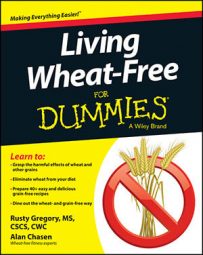If variety is the spice of life, then recipes for vegetables in your wheat-free diet will make your life plenty spicy (figuratively speaking, of course). Variety in this context means foods with a wide range of vitamin and mineral content.
Nutritionally speaking, here's what's happening in many veggie-based wheat-free side dishes:
Asparagus: This green, white, or purple vegetable is rich in vitamins A, B6, C, E, and K and in minerals such as folic acid, copper, and iron. The chromium in asparagus helps insulin move blood sugar into muscle cells, where it can be used for energy. The antioxidants and glutathione in asparagus help prevent cancer by eliminating free radicals and carcinogens.
Broccoli: Generally regarded as one of the healthiest vegetables in the world, broccoli's cancer-fighting abilities are second to none. It provides a healthy dose of vitamins A, C, and K; folate; potassium; and even omega-3 fatty acids.
Brussels sprouts: These baby cabbages belong in the same family as broccoli, collard greens, and kale. This nutritional superstar is loaded with vitamins C and A and beta carotene, helping to prevent cancer and heart disease. Brussels sprouts’ high level of omega-3 fatty acids and anti-inflammatory effects help keep diseases at bay.
Cauliflower: Cauliflower's cancer-fighting phytochemicals (naturally occurring chemical compounds) are capable of halting cancer growth in certain organs. Cauliflower also contains many B vitamins that help with carbohydrate metabolism, which assists in weight loss, and minerals such as copper, potassium, iron, and calcium.
Collard greens: Collard greens pack a powerful punch in disease prevention. Their high levels of vitamins C and A and beta carotene bolster the immune system and assist in preventing cancer and heart disease. The folate, vitamin B6, and magnesium in collards contribute to an improvement in heart health. Plus, they provide a source of calcium.
Kale: One of the hottest food topics today is the health-promoting aspects of kale. With its large quantities of vitamins A, C, K, and B6 and its phytochemicals, it's a formidable foe in the assault against disease. Potassium, also found in kale, helps control heart rate and blood pressure.
Spinach: As evidenced by a certain cartoon sailor's superhuman acts of heroism, spinach is one of the most nutrient-dense foods available. It helps fight cancer with its high levels of antioxidants, heart disease with its vitamin C and beta carotene, and anemia with its excellent iron content.
Besides the veggies listed here, you can choose from many other options. Try cabbage, mushrooms, cucumbers, squash, zucchini, and all types of peppers, whether eaten by themselves or included in a recipe.
Many people consume white potatoes and corn as their primary vegetables, but they are both foods to be limited on a wheat-free diet. Both spike blood sugar levels.
You might be tempted to throw a bag of frozen peas into the microwave and call it a side dish, especially at the end of a long day. But by taking a few extra minutes, you can produce a balanced side dish that your family will want seconds of.

